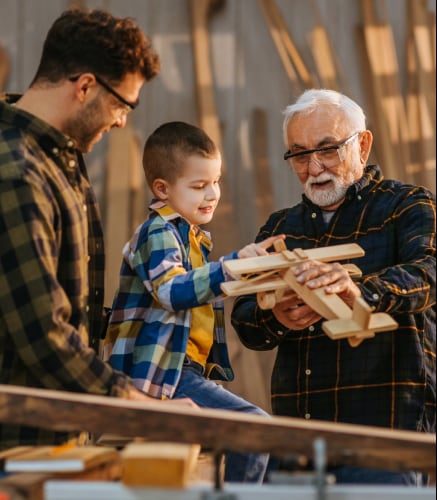Your charitable giving has allowed you to make a lasting imprint on society, your community and the world.
Getting family members involved in your philanthropy may be an important part of your overall wealth transfer plan. If you are just beginning to have conversations about your charitable giving goals and activities with family members it is important to give them an opportunity to share their own interests with you.
The most rewarding family philanthropy reflects the shared values and interests of all family members. Taking the time to assess individual readiness and interest in charitable work will make your family’s philanthropy stronger. The following questions and your answers will help you have more meaningful conversations and can spark an valuable exchange of ideas and perspectives:
Lay the Foundation
To encourage your family to make a real and lasting difference in the world, you may wish to reflect on these foundational questions.
- What strengths will family members bring to your philanthropic giving?
- Who will participate in the family’s philanthropy?
- How much time can you and your family commit to charitable giving?
- Have you decided on one or more charitable giving vehicles, such as a donor advised fund or private foundation?
Share Motivations and Values
The values you share with your family can be empowering, build trust, encourage accountability and establish expectations. Communicating your giving philosophy with your family can make it easier for them to understand your motivations to create and continue a family philanthropy legacy.
- Why do you give?
- What values have your family and other role models passed on to you?
- What are some of your favorite family traditions?
- What are some of your family’s most important shared values?
- What life experiences have shaped your beliefs or approach?
Determine Communication Methods
In order to plan for your family’s philanthropy in a way that takes all perspectives into account, it is important to understand how your family functions.
- What are your norms or methods for communicating, meeting, making decisions together and resolving conflicts?
- Does your family make any decisions together about family wealth or charitable matters? How does your family communicate and collaborate to make those decisions?
Create Space for New Perspectives
Once you have shared your values it is important to listen to others who will participate in your family’s philanthropy. Be a good listener and allow for dialogue across generations, interest areas and geographic areas of focus. If family members whom you would like to bring into the conversation feel as if they are not being heard or are not a part of the discussion, they may, understandably, be less likely to stay engaged.
- How much do you know about the causes that interest other family members? What are they?
- How much and in what ways do you think other family members would like to be involved in philanthropy?
- Are there areas of common interest among the whole family?
Convey Your Wishes
Take some time to reflect on the information and ideas shared by family members; consider finding opportunities to deepen their understanding of the issues that matter most to them. Then, take steps to include them in your current philanthropic activities.
- How much do your family members know about your current philanthropic activities?
- What have you shared about how you would like them to be involved in the family’s philanthropic plans?
- Are you willing to invest the time to prepare family members for philanthropic stewardship?
Once you have been able to share your interests and values with your family and have worked to understand how they would like to be involved, you can discover opportunities for family engagement.
Many families are focused on engaging the next generation, represented by Millennials and Gen Zers. The next generation may have different ideas about how to give in comparison to the other generations, but they generally have similar views on why they give. This is largely due to the formative lessons learned from their parents, grandparents and others involved in their upbringing.
In a recent survey administered by 21/64, an independent, nonprofit practice considered an authority on engaging the next generation in philanthropy, almost 90% of those surveyed said their giving was influenced by their parents and 63% said their grandparents had inspired them to give.1 Your family may identify ways to encourage multi-generational dialogue. Younger generations could interview older generations to preserve family history and create a space for learning more about their philanthropy, for example.
By taking the time to articulate and model your values and interests with your family, you can help shape the next generation of donors and influence your family legacy. Whether your family is already engaged or is just beginning the process, you have the ability to create a legacy of giving and provide a bright philanthropic future for your family. Family engagement will require a consistent commitment of time and resources. By participating in this process, you and your family may gain a deeper understanding and appreciation for working with each other.



